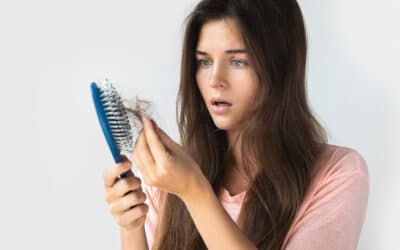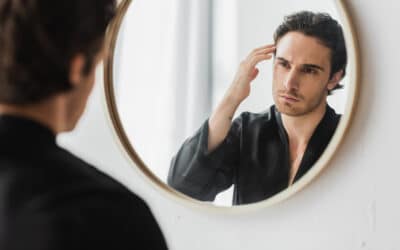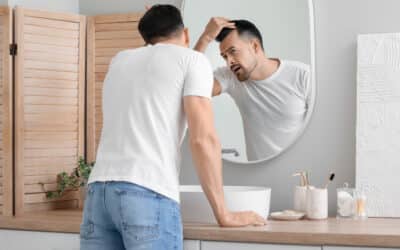When it comes to fitness supplements, creatine stands out as one of the most popular and well-researched. From professional athletes to casual gym-goers, many have turned to creatine to enhance their performance, increase muscle mass, and boost overall strength. However, a lingering question often accompanies its use: does creatine cause hair loss?
In this blog, we’ll dive deep into the relationship between creatine supplements and hair loss, debunk myths, and provide you with the facts.
What is Creatine?
While there are several misconceptions about creatine supplementation, it is a naturally occurring compound found in muscle cells, playing a crucial role in the production of energy during high-intensity activities like weightlifting and sprinting. It’s also available as a dietary supplement, commonly used to enhance athletic performance and promote muscle growth.
Potential benefits and effects of creatine supplementation include:
- Supports lean muscle mass
- Improved muscle strength
- Improved brain function
- Weight gain from water retention
- Boosts high-intensity exercise performance
- Treats fatigue and muscle cramps
- Increases energy for muscle contractions
Why Do People Think Creatine Causes Hair Loss?
The primary concern surrounding creatine and the potential side effects of hair loss stems from a 2009 single study conducted on college-aged rugby players. This study suggested that the popular sports supplement might increase dihydrotestosterone (DHT) levels. DHT is a potent androgen known to contribute to androgenic alopecia, commonly known as male-pattern baldness.
While the study has suggested potential links between high testosterone levels and creatine monohydrate supplementation in exercise, more concrete evidence is needed to support the idea of creatine hair loss.
The Link Between DHT and Hair Loss
DHT is derived from testosterone through the action of the enzyme 5-alpha reductase. It’s essential for the development of male characteristics, but elevated levels can shrink hair follicles, leading to hair thinning and loss, particularly in individuals genetically predisposed to androgenic alopecia.
Examining the Scientific Evidence
While the 2009 study indicated a potential link between creatine supplementation and increased DHT levels, it’s important to consider several key points:
- Sample Size and Scope: The study involved a small sample size of 20 rugby players, which limits the generalizability of its findings. Larger, more comprehensive studies are needed to draw definitive conclusions.
- Short-Term Observation: The study observed participants over a short period (three weeks), leaving questions about long-term effects unanswered.
- Lack of Consistent Evidence: Subsequent scientific studies on creatine have not consistently supported the claim that creatine raises DHT levels or directly causes hair loss. Many athletes and fitness enthusiasts use creatine without experiencing hair thinning or loss.
Personal Factors Matter
It’s crucial to recognize that individual responses to supplements can vary. Factors such as genetics, overall health, and existing hormonal levels play significant roles in how one’s body reacts to creatine. If you have a genetic predisposition for androgenic alopecia, you may be more susceptible to hair loss, regardless of creatine use.
Other factors that may influence hair loss include:
- Underlying medical conditions
- Imbalances in sex hormone levels and hormonal fluctuations
- Diet and nutrition
- Lifestyle habits such as smoking and alcohol consumption
- Hair loss conditions such as androgenetic alopecia
- Stressful events
Tips for Safe Creatine Use
Creatine monohydrate is among the most studied fitness supplements and is considered safe for healthy individuals by medical professionals.
If you’re considering or currently using the popular supplement and are concerned about potential hair loss, here are some tips to keep in mind:
- Monitor Your Hair Health: Pay attention to any changes in your hair density and consult a healthcare professional if you notice significant hair thinning or shedding.
- Stay Informed: Keep up with the latest research on the supplement’s effect on hair loss to make informed decisions about your supplement use.
- Balanced Diet: Ensure you maintain a balanced diet rich in essential nutrients for overall health, including hair health.
- Consult a Specialist: If you have concerns about hair loss, consult with a hair restoration specialist who can provide personalized advice and treatment options.
The Verdict on Creatine and Hair Loss
The current body of evidence does not conclusively link consumption of creatine to hair loss. While the 2009 study raised valid questions, more extensive research is necessary to establish definitive evidence creatine affects hair growth. As with any supplement, it’s essential to consider individual factors and consult with healthcare professionals when making decisions about your health.
What Should I Do If I’m Experiencing Hair Loss?
As a natural part of the aging process, some degree of hair loss throughout your lifetime is inevitable. Fortunately, with the latest advancements in medical aesthetics, there are many hair loss treatments that are accessible and effective.
Whether you’re beginning to notice thinning hair and bald spots, or you’ve been dealing with progressive hair loss such as a recessed hair line, Complete Hair Restoration offers a wide range of treatments to replenish a flowing mane.
We offer the following hair treatments:
- Bio Injections
- SmartGraft FUE Hair Transplantation
- Laser Hair Growth Cap
- Nutrafol
- LockRx
- Topical Hair Solutions
Restore a Healthy Head of Hair Today!
At Complete Hair Restoration, we’re committed to helping you navigate the complexities of hair health. If you have concerns about hair loss or are seeking effective restoration solutions, our team of experts is here to support you every step of the way. Remember, informed choices lead to better outcomes for both your fitness goals and hair health.
For more personalized advice and treatment options, contact Complete Hair Restoration today!




